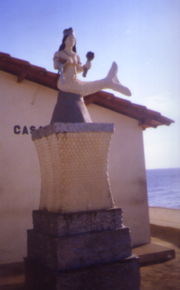- Yemaja
-
Attribute von Iemanjá Farben Blau, versetzt mit Weiß, sinnbildlich für die Schaumkronen auf dem Wasser. Zahlen 7 Kath. Heilige(r) Virgen de Regla  Iemanja-Figur in Rio Vermelho
Iemanja-Figur in Rio VermelhoIemanjá, Yemayá (Yemoja, Yemanjá, Iemoja) ist in der Religion der Yoruba und im Santeria- und Candomblé-Kult die Gottheit (Orisha) des Meeres und der Mutterschaft. Sie ist Mutter der gesamten Menschheit, Hüterin des Heimes und Schutzpatronin der Seefahrer. Die wörtliche Übersetzung ihres Namens ist "Mutter der Fische". Andere Namen sind Dandalunda und Pandá.
Ihr Tag ist der Samstag. Ihre Farben sind weiß und hellblau, ihr Metall ist das Silber. Um ihr zu danken, Wünsche an sie zu richten oder ihr zu huldigen, werden in Brasilien traditionell Blumen, Düfte oder andere kleine Gaben an das Meer geschenkt. Entweder vertraut man die Gaben am Ufer des Meeres den Wellen an, oder man fährt mit dem Boot hinaus und legt diese ins Wasser.
Yemayá gilt als eine der wichtigsten Orishas in Kuba.
In Afrika ist Yemoja eine Flussgöttin: Ihr gehört der Fluss Ogun.
Weblinks
- Dr. Hans Gerald Hödl Vorlesung 2003:Einführung in die Religion der Yorùbá (PDF, 1,9 MB)
- Thomas Altmann Artikel 2004: Yoruba-Religion (Lukumí) und viele Weblinks
- Kerstin Volkenandt: Kapitel 6.1 des Essays: Olodumare und die orishas
Wikimedia Foundation.
